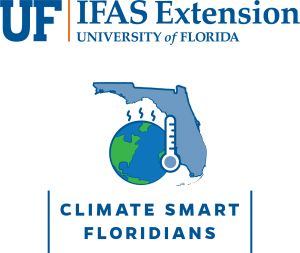The U.S. Environmental Protection Agency has forecast some major issues for Florida due to climate change. Rising sea level means retreating shorelines and more coastal flooding. Hotter than normal temperatures mean stress on the state’s water supply, livestock, and crops – not to mention people.
While climate change is a large and complex problem, Florida residents can still make an impact to help the environment. Climate Smart Floridians, a new program from UF/IFAS Extension and Florida Sea Grant, aims to educate residents on what they can do to reduce their greenhouse gas emissions.
 Ashley Smyth, assistant professor of biogeochemistry in the UF/IFAS Soil and Water Sciences Department, Holly Abeels, Brevard County Extension and Florida Sea Grant agent, and Alicia Bradigan–Betancourt, Monroe County Extension director, worked together to create the program. It is modeled after the successful Climate Masters classes offered in several western states. They are sharing the resources with other UF/IFAS Extension and Florida Sea Grant agents who would like to offer the program in their communities.
Ashley Smyth, assistant professor of biogeochemistry in the UF/IFAS Soil and Water Sciences Department, Holly Abeels, Brevard County Extension and Florida Sea Grant agent, and Alicia Bradigan–Betancourt, Monroe County Extension director, worked together to create the program. It is modeled after the successful Climate Masters classes offered in several western states. They are sharing the resources with other UF/IFAS Extension and Florida Sea Grant agents who would like to offer the program in their communities.
“We know climate change is having a negative impact on Florida. We want to do something about it,” Smyth said. “Climate Smart Floridians addresses the challenges, but it also puts the power in the hands of the participants to make changes to improve the situation.”
The Program
Climate Smart Floridians is made up of nine information modules. Topics include home energy use, “green” building, food waste and your food footprint, and water conservation and drought. Each module contains key learning points and ends with actions Floridians can take to cut greenhouse gas emissions. There are further resources on each topic for participants who want to learn more.
“We wanted to make sure participants could learn how easy it is to lower their greenhouse gas emissions and to think about how they can adapt to climate change,” Abeels said. “The modules are easy for community groups, Extension agents, or anyone to teach. They also can be adapted to include information about their local area or region.”
Abeels said that participants can learn from each other and support changes in each other’s daily life, which may seem small but can have larger impacts.
Promoting Within
The team shared the program with some IFAS Extension agents in March and April. A few have already begun using the modules with participants, while others plan a more comprehensive launch this fall. Still, more are being recruited to offer the program.
“Not only do participants learn ways to help reduce their environmental impact but often find significant financial savings,” Bradigan-Betancourt said. “Climate change seems like a daunting issue and the average person might not think they can make an impact. But in fact, they can, and this program shows them how.”
Climate Smart Floridians is a flexible program that can be taught as a series of all nine modules, or an individual module can stand on its own. To find out more about the program, you may contact Holly Abeels <habeels@ufl.ed>, Alicia Bradigan-Betancourt <abb@ufl.edu>, or Ashley Smyth <ashley.smyth@ufl.edu>.
 1
1
